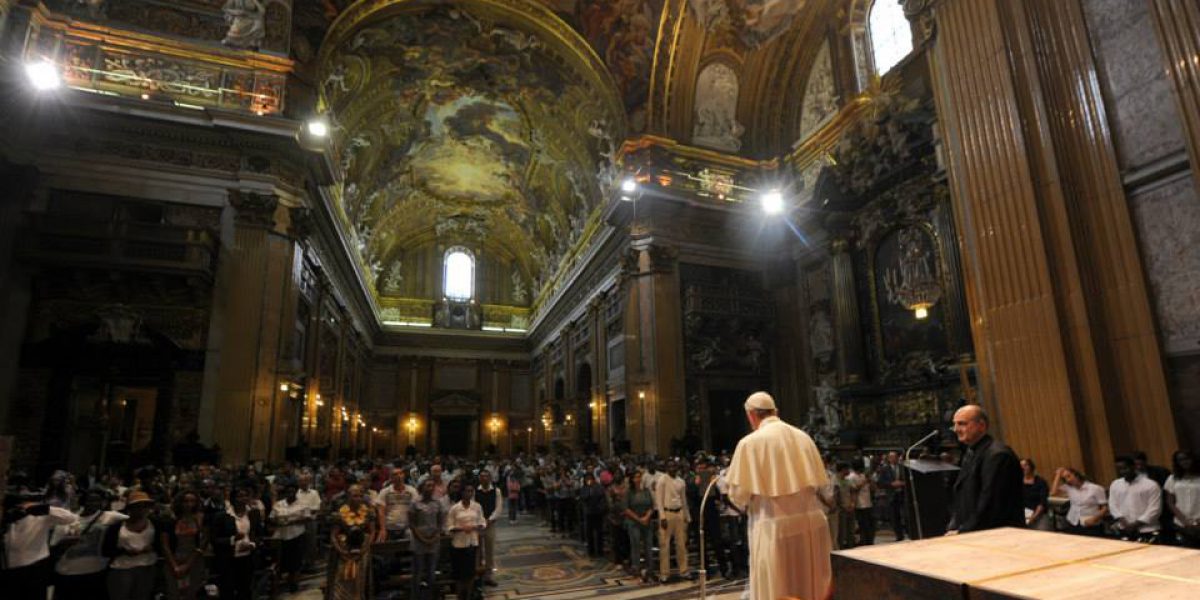
Rome, 12 September 2013 – Pope Francis made an official visit to the JRS Italy soup kitchen in Rome on Tuesday. Immediately following his visit, the Holy Father delivered this speech to those gathered in the Chiesa del Gesù, a Jesuit church in the centre of Rome where the headquarters of JRS Italy is located.
Dear Brothers and Sisters, good afternoon!
First of all I greet you, men and women refugees. We listened to Adam and Carol: thank you for your strong, deeply-felt testimonies. Each one of you, dear friends, bears a life story that speaks of the tragedies of war, of conflicts, often linked to international politics. But every one of you bears, above all, a human and religious richness, a richness to be welcomed, not feared. Many of you are Muslims or of other religions; you come from several countries, from different circumstances. We must not be afraid of difference! Fraternity makes us discover that it is richness, a gift for all! Long live fraternity!
Rome! After Lampedusa and the other places of arrival, for many persons, our city is the second stage. Often – as we heard – it’s a difficult, exhausting journey; what you face can even be violent – I’m thinking above all of the women, of mothers, who endure this to ensure a future for their children and the hope of a different life for themselves and their family. Rome should be the city that allows refugees to rediscover their humanity, to start smiling again. Instead, too often, here, as in other places, so many people who carry residence permits with the words “international protection” on them are constrained to live in difficult, sometimes degrading, situations, without the possibility of building a life in dignity, of thinking of a new future!
So, thank you to all those, like this in Centre and other ecclesial, public and private entities whose work is organised to welcome these people. Thank you to Fr Giovanni and to fellow Jesuits; to you, workers, volunteers, benefactors, who don’t just give something or some time, but who try to enter into a relationship with asylum seekers and refugees, recognising them as people, committed to finding concrete responses to their needs. Always keep hope alive! Help to recover trust! Demonstrate that with welcome and fraternity a window to the future can be opened – more than a window, a door, and even more that it is possible to have a future! And it’s lovely that those working for refugees with the Jesuits are Christian men and women and also non-believers or members of other religions, united in the common good, which for us Christians is an expression of the love of the Father in Christ Jesus. Saint Ignatius of Loyola wanted a place in his Rome residence to welcome the poorest, and in 1981, Father Arrupe founded the Jesuit Refugee Service, and wanted the Roman headquarters to be in those premises, in the heart of the city.
Serve, accompany, advocate: the three words are the programme of work for Jesuits and their collaborators.
Serve. What does it mean? To serve means to welcome people who arrive here with care; it means to bend down to one in need and to extend your hand to him, without reservations, without fear, with tenderness and understanding, as Jesus bent down to wash the feet of the Apostles. To serve means to work alongside the neediest, first of all to establish a close human relationship with them, based on solidarity. Solidarity, this word elicits fear in the developed world. They try not to say it. It’s almost a dirty word for them. But it’s our word! To serve means to recognise and welcome the demands for justice, for hope, and to seek ways together, a concrete path of liberation.
The poor are also privileged teachers of our knowledge of God; their fragility and simplicity will unmask our egoisms, our false securities, our pretences of self-sufficiency, and guide us to the experience of the closeness and tenderness of God, to receive His love in our life, His mercy of a Father who with discretion and patient trust, takes care of us, of all of us.
From this place of welcome, of encounter and of service I would like you all, all those living in this diocese of Rome, to ask yourselves this question: do I kneel down to someone in difficulty or am I afraid to soil my hands? Am I closed in on myself, focused on my things, or do I notice those in need of help? Do I just serve myself or am I able to serve others as Christ did to point of giving his life? Do I look into the eyes of those who seek justice or do I look the other way so as not to look into their eyes?
Accompany. Over these years, Centro Astalli has been on a journey. In the beginning, it offered initial reception services: a soup kitchen, a place to sleep, legal aid. Then it learned to accompany persons in their search for employment and social inclusion. And later, it organised cultural activities so as to contribute to the growth of a culture of welcome, a culture of coming together in solidarity, beginning with the protection of human rights. Hospitality in itself isn’t enough. It’s not enough to give a sandwich if it isn’t accompanied by the possibility of learning to stand on one’s own feet. Charity that does not change the situation of the poor isn’t enough. True mercy, which God gives and teaches us, calls for justice, for a way in which the poor can find a way out of poverty. It calls for – and asks us the Church, us the city of Rome, to the state– a situation in which no one in need of a soup kitchen, of a homeless shelter, of legal assistance to have his right to live and to work recognised, to be a whole person.
Adam said: “We, refugees, have a duty to do our best to be integrated in Italy.” But integration is a right! And Carol said: “Syrians in Europe feel a great responsibility not to be a burden; we want to feel an active part of a new society.” This, too, is a right! Look, this responsibility is the ethical basis; it’s the strength we build together. I wonder: do we accompany them on this journey?
Advocate. To serve, to accompany means also to defend; it means to be on the side of the weakest. How many times we raise our voice to defend our rights, but how many times we are indifferent to the rights of others! How many times we don’t know or do not wish to give voice to those who – like you – have suffered and suffer, those who have seen their rights trampled upon, those who have experienced so much violence that even their desire to have justice has been suffocated!
It’s important for the whole Church that the welcome of the poor and the promotion of justice are not entrusted only to “specialists,” but that they are the focus of attention of all the pastoral work, of the formation of future priests and other religious, of the normal commitment of all parishes, movements and ecclesial groups. In particular – and this is important and I say it from my heart – I would also like to invite religious congregations to read seriously and responsibly this sign of the times.
Dear religious men and women, the Church does not need to turn empty convents into hotels to earn money. Empty convents are not ours, they are for the flesh of Christ, for refugees. The Lord is calling us to be more courageous and generous in welcoming in our community, homes, in empty convents. It certainly isn’t something simple; we need criteria, responsibility, but also courage. We do a lot, perhaps we are called to do more, welcoming and sharing with determination what Providence has given us to serve: Overcoming the temptation of spiritual worldliness to be close to ordinary people and especially the neediest. We are in need of communities of solidarity that live out love in concrete ways!
Every day, here and in other centres, so many people, especially young people, queue for a hot meal. These people remind us of the suffering and tragedies of humanity. But that queue also tells us that it is possible for all of us to do something now. It is suffice to knock on the door, and say: “I’m here. How can I give a hand?”
Dear brothers and sisters, good afternoon!

